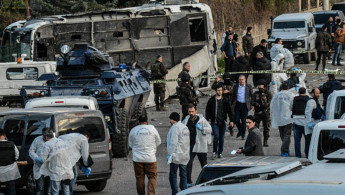Curfew hits southeastern Turkish town as fresh violence flares
Turkish authorities declared a full-day curfew on Tuesday in the southeastern town of Silopi, after a Turkish police officer was killed and four others wounded when rockets - allegedly fired by the outlawed Kurdistan Worker's Party [PKK] - hit their vehicle.
Witnesses reported heavy gunfire early on Tuesday as fresh clashes erupted in the Kurdish-majority town.
It has not yet been possible to confirm casualities on the Kurdish side.
The attack comes a day after Turkish President Recep Tayyip Erdogan again vowed to stamp out the militant group.
"The terrorists can choose two paths: surrender to justice or be neutralised, one by one. There is no third way left in Turkey," Erdogan said.
| Read more: Erdogan says time for PKK peace talks is over |
Violence between the Turkish forces and the PKK has only continued to escalate since the breakdown of peace talks last year.
Last month, Erdogan announced that more than 350 members of the Turkish security forces had been killed since July 2015, while more than 5,000 Kurdish militants had been "neutralised".
Fighting in the Kurdish-dominated regions of southeastern Turkey has left hundreds of thousands homeless as they seek safety from the fighting.
At least 355,000 people have fled their homes in Cizre, Silopi, Nusaybin and Diyarbakir's Sur district, the Turkish Human Rights Foundation [TIHV] reported.
The towns of Cizre and Silopi in particular have witnessed significant urban destruction.
| Read more: Cizre residents return to a city devastated by fighting |
Earlier this week, a rocket attack killed an army major and a police officer in the Syria-border town of Nusaybin, where an ongoing curfew entered its third week.
The attacks followed a further series of incidents last week, when four Turkish police officers were killed and 14 people injured in a bomb attack in the Kurdish-majority city of Diyarbakir.
More than 40,000 people have been killed since the PKK, designated a terrorist group by Ankara, took up arms in 1984 demanding an independent homeland for Turkey's largest minority.
Since then, the group has scaled back its demands to focus on cultural rights and a measure of autonomy.
The conflict was nearing a resolution until an uneasy truce was shattered last July.





 Follow the Middle East's top stories in English at The New Arab on Google News
Follow the Middle East's top stories in English at The New Arab on Google News
![Israeli forces ordered bombed Gaza's Jabalia, ordering residents to leave [Getty]](/sites/default/files/styles/image_330x185/public/2176418030.jpeg?h=a5f2f23a&itok=_YGZaP1z)

